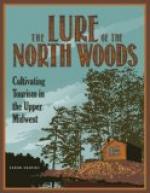Drummond drained his glass. “You’re mean, but I gotter make a start. Where’s the bills?”
Stormont gave him some paper money, and then turned to the clerk. “See about mailing the letters, Watson.”
The clerk went out, knowing why he had been sent. His employer trusted him where he was forced, but did not want him to hear what Drummond had to say.
When Watson had gone Drummond knitted his brows, as if trying to remember something. “The vein runs out on the face of a cliff, ’bout forty paces from the first rampike pine; there’s three or four rampikes, but the fire hadn’t gone far into the bush.”
“Not much of a clue! There are patches of burned forest all over the country,” Stormont remarked.
“Don’t interrupt!” said Drummond, with a frown. “It’s pretty hard to remember. Give me ’nother drink. I wanter get it right.”
Stormont filled his glass and he resumed in an unsteady voice: “Cliff rises from the creek in a little round hollow. There’s a big rock near the top of the divide opposite—”
“Go on. How does the creek run?”
“You’re hustling me,” Drummond grumbled. “I wanter think. It’s important. Knowing how the creek runs fixes where she is.” He paused, and a vague distrust of Stormont entered his bemused brain. He had got the fifty dollars and saw, with drunken cunning, that it might be prudent to keep something back. “She runs south.”
“South?” exclaimed Stormont, who knew that the natural drainage of the region is north-east to James Bay.
“Sure,” said Drummond, with a sullen look. “Strange told the old man, and the old man told me.”
Stormont pondered. If the creek flowed south, it drained a subsidiary basin and probably filled a lake from which a river ran north or east. The clue was worth fifty dollars because it would simplify the search for the lode.
“How does the creek lie from the factory?”
“’Bout south-west,” said Drummond in a thick, drowsy voice. “There isn’t a factory at Longue Sault now. Company moved the post after the old man left.”
“How far is the creek from where the post was?”
“Lemme think,” Drummond muttered, and his eyes half closed. “Old man reckoned Strange made it in a fortnight’s march.”
“From the creek, or from the place where he was sent? Or do you mean the double journey?”
“Don’t know,” Drummond answered dully. “Old man said fortnight. Told you all I remember.”
Then he slipped down in the big chair, his head drooped forward, and he fell into a drunken sleep. Stormont got up and leaned against the table. He had borne some strain in the last few minutes, because it had been obvious that Drummond was overcome by liquor and would soon be unable to talk, while when he woke up sober he might repent his rashness. Now Stormont imagined he had told him all he knew, and it ought to be worth fifty dollars. Lighting a cigar, he waited until his clerk came back, when he indicated Drummond, who lay, snoring heavily, with his dirty boots on Stormont’s bed.




